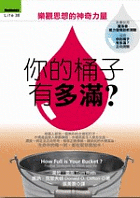Each of us has an invisible bucket. It is constantly emptied or filled, depending on what others say or do to us. When our bucket is full, we feel great. When it's empty, we feel awful.
Each of us also has an invisible dipper. When we use that dipper to fill other people's buckets -- by saying or doing things to increase their positive emotions -- we also fill our own bucket. But when we use that dipper to dip from others' buckets -- by saying or doing things that decrease their positive emotions -- we diminish ourselves.
Like the cup that runneth over, a full bucket gives us a positive outlook and renewed energy. Every drop in that bucket makes us stronger and more optimistic.
But an empty bucket poisons our outlook, saps our energy, and undermines our will. That's why every time someone dips from our bucket, it hurts us.
So we face a choice every moment of every day: We can fill one another's buckets, or we can dip from them. It's an important choice -- one that profoundly influences our relationships, productivity, health, and happiness.
水桶與杓子理論
我們每個人都有一個無形的水桶,水桶裡的水不斷增減,端視別人如何對待我們。水桶滿溢時我們會心情愉快,乾涸見底時則令人沮喪。
每個人也都有一支無形的杓子,當我們舀水到別人的水桶裡--以言行為別人增添正面情緒--也會讓自己的水位高一些;反之,如果你用杓子去舀別人的水--亦即你的言行有損別人的正面情緒--自己桶子裡的水也會跟著減少。
裝滿水的水桶就如同滿溢的福杯,讓人思想正向、充滿活力。水桶裡的每一滴水都會讓人更堅強、更樂觀。
空空的水桶則會讓人思想悲觀、精神萎靡、意志頹廢。這也是為什麼被別人舀水是一種痛苦的經驗。所以說,我們每一刻都面臨一個抉擇:我們可以為彼此加水,也可以互相舀水。我們的人際關係、生產力、健康狀況、快樂與否都深受這個選擇影響。
Excerpted from the Simon & Schuster audiobook, HOW FULL IS YOUR BUCKET, read by Tom Rath
Windows Media Player version 9.0 or higher required
Fast Facts From How Full Is Your Bucket?
- The number-one reason people leave their jobs: They don't feel appreciated.
- 65% of Americans received no recognition in the workplace last year.
- Bad bosses could increase the risk of stroke by 33%.
- A study found that negative employees can scare off everycustomer they speak with--for good.
- 9 out of 10 people say they are more productive when they're around positive people.
- Relentless negativity resulted in a 38% POW death rate -- the highest in U.S. military history.
- We experience approximately 20,000 individual moments every day.
- The magic ratio: 5 positive interactions for every 1 negative interaction.
- Too much positive emotion? More than 13 positive interactions for every 1 negative interaction could decrease productivity.
- Extending longevity: Increasing positive emotions could lengthen life span by 10 years.
 |
| 唐諾.克里夫頓 著
被美國心理學協會譽為「天賦心理學之父」(Father of Strengths Psychology)、正向心理學(Grandfather of Positive Psychology)開山祖師,曾是蓋洛普公司董事長及教育中心主任,他所發明的「克里夫頓能力發現剖析測驗」,已幫助全球超過一百萬受測者發現個人天賦。克里夫頓與人合著不少書籍,包括暢銷書《發現我的天才》(商智文化出版)。 |
| 湯姆.雷斯 著
畢業於密西根大學,目前在約翰.霍普金斯大學攻讀研究所。現為蓋洛普公司全球訓練部門負責人,專門負責帶領團隊開發各項業務、書籍與專業人士訓練計畫,其中包括科學、科技及語言等領域,暢銷書《發現我的天才》(商智文化出版)(Now,Discover Your Strengths)正是雷斯的經典之作。 |
張美惠 譯
台大外文系畢,輔仁大學翻譯研究所肄業。曾得「梁實秋文學獎」譯詩組佳作,譯有《德國短篇小說精選》及時報出版之《EQ》、《EQ測驗書》、《美之為物》、《血、汗與淚水》、《未來大贏家》等書。 |
|


 字體:小 中 大
字體:小 中 大









